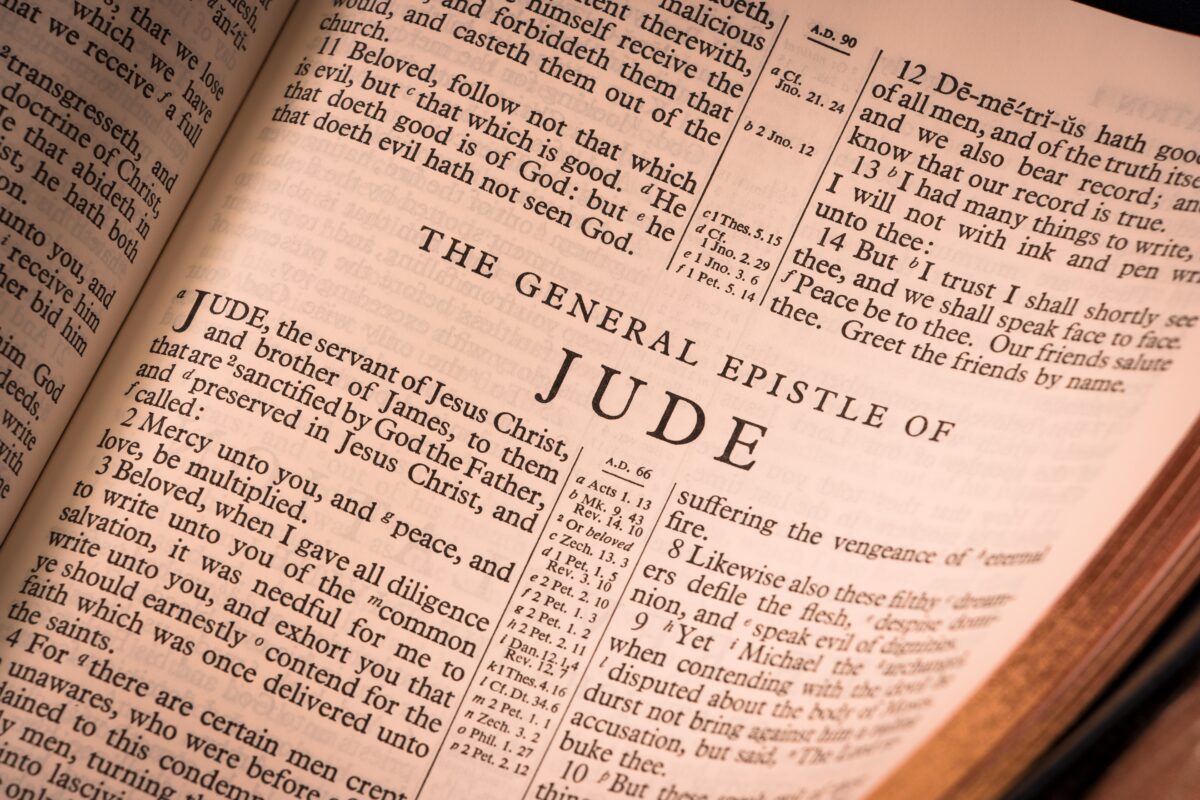Any Bible-believing Christian who is in touch with the state of today’s religious climate knows that the vast majority of the professing church seems to be morally and theologically shipwrecked. While this is certainly a bleak observation, it is nonetheless a true one. Certain questions continually arise in the minds of those who desire to be faithful to sound doctrine: “Why do so few Christians seem to care about truth and doctrinal purity?” “Why are ‘feel-good’ churches growing while separated, fundamentalist churches are shrinking?” “Is it too much to ask for a church to focus on expository preaching and to separate from compromised fellowships?” These questions frequently enter the minds of many who desire to uphold the entire Word of God as their foundation for Christian living and their instruction on how to possess a right relationship with God. Yet God’s Word provides answers to these questions. His Word tells us that heresy, compromise, self-focus, and apostasy will flourish with time. In fact. He addressed this very issue in one New Testament book that is often overlooked or misunderstood by many in the church today. Yet this message is just what we need!
The epistle of Jude is unique in that it is the only book in the New Testament canon that deals exclusively with apostasy in the church. Notice the chronological order of our New Testament: The four Gospels provide us with information regarding the life of Christ and His offer of the Kingdom to Israel; Acts provides the historical background for the beginning of the church following Christ’s death, resurrection, and ascension into heaven; Romans lays the theological foundation for our faith, descriptively detailing Christ’s perfect work and our responsibility as men and women created in the image of God; Paul’s other epistles lay down the doctrine that is to be embraced and defended by the church and touch upon the dangers of apostasy and false doctrine; Peter’s epistles contain warnings about the false teachers that would soon enter the church: John’s epistles address the key to fellowship with God and refute the doctrines of the false teachers who were then deceiving the church. The epistle of Jude, however, was written for one purpose alone: to warn of the apostates who had already entered the church and to tell the believers how to deal with those who rejected the doctrine of the apostles.
The book of Jude is as timely today as it was in the first century. Peter had warned that false teachers were about to enter the church (2 Pet. 2:1-3), and Jude declared that those false teachers were already within the church at the writing of his epistle (Jude 4, 16). If the need to contend against error was urgently needed in the first century, certainly it is necessary more than ever today, hundreds of years later. Yet today we find a lethargy that exists within professing Christendom, even within supposed evangelical, fundamentalist churches and organizations. Somehow, today’s Christians feel as though doctrine is not important; theology does not matter; contending for the faith is passé. They feel that as long as individuals are coming to Christ or that their lives are being changed for the better through “lively churches,” therapeutic programs, or the latest spiritual fad, then Christ must be honored through all such means and to separate from such would be too “divisive” or “unloving.” In other words, many Christians today have completely sold out to the idea that “the end justifies the means.” Pragmatism reigns supreme. Obedience and sound doctrine are not important, only visible results of changed lives. Why do many evangelical Christians, including biblical fundamentalists, feel so comfortable around compromise and feel-good theology rather than sound doctrine?
First, because they have either forgotten, disregarded or never understood their biblical and historical roots. They do not remember that in the early part of the twentieth century, godly men and women interpreted the Bible literally and recognized that apostasy and unbelief would pervade the church in the last days. These believers realized that in order to honor and glorify God, they had to separate from any churches or denominations that tolerated false doctrine and defend the doctrines of Scripture that were being attacked. In other words, they were required to take both an offensive and a defensive position: They needed to separate from error and defend and proclaim sound doctrine. Not surprisingly, many of today’s evangelicals are doing neither. They take the Scripture literally only as far as It meets their own perceived spiritual or emotional needs or only as far as it is acceptable with the unbelieving world. They only define “false doctrine” as that which is taught by Jehovah’s Witnesses, Mormons, or other cults that are far-removed from mainstream Christianity. Jude reminded his readers that they were to remember “the words which were spoken before of the apostles of our Lord Jesus Christ” (v. 17). They were to remember their roots and were instructed to embrace and contend for the faith (all the doctrine) “which was once delivered unto the saints” (v. 3). To live only in the present, forgetting the importance of the apostle’s doctrine, was to succumb to the apostates who were taking advantage of forgetful believers (v. 16).
Second, because they have come to embrace a pragmatic brand of Christianity. If a church is too small or if it lacks youth or community outreach programs, then it is not worthy of their support. On the other hand, if a nationally renowned men’s movement or women’s movement comes to town hosted by an array of notable preachers or authors who have the attention of thousands of people, such a meeting merits their attendance. Likewise, such people are drawn to those churches that actively seek to attract the unsaved and are outwardly successful in their endeavors. These believers have adopted a pragmatic theology that, despite its neglect of sound doctrine and defense of the faith, appeals to their own idea of “genuine Christianity.” Again, Jude addressed this grievous error as well. He reminded the believers that the false teachers would “speak great swelling words” and be admired by men (v. 16). The ideas, strategies, and programs of these teachers appealed to the early Christians and, most likely, attracted great crowds. But these men were defined by God as apostates, and their doctrine was to be fought against by true believers.
Third, because they have never received a solid theological foundation in their own churches. Their pastors and teachers are powerful motivational speakers, but they are weak expositors of the Word of God. The believers sitting in the pews are continually fed milk rather than meat. Their pastors and leaders are more concerned about buildings and numbers than with “rightly dividing the Word of Truth” to the congregation. Because these pastors place more emphasis on outward action for Christ rather than on genuinely knowing Him and understanding His will through the careful, diligent study of His Word, the believers in the pews are void of true conviction. Therefore, when error subtly begins to creep into the church, they are susceptible. They do not know how to identify error when they are confronted with it. In an indirect way, Jude addresses this dilemma as well. He exhorts the believers in the church to fight for the faith once delivered and to remember the apostle’s doctrine (vv. 3, 17). Obviously, the believers could not call to remembrance and fight for true doctrine unless they were taught it in the first place.
Fourth, because they feel as though the responsibility to separate, warn and earnestly contend is delegated only to the leaders of the church. They leave it up to their pastors to decide whether or not a compromising evangelist or speaker should be invited to their church or to decide whether or not to allow member involvement in ecumenical or moral crusades. And, if their pastor compromises in one such respect, they are comfortable with his decision. Again, Jude’s letter addresses such attitudes. The epistle of Jude was written to all believers in the early church. It is a general epistle to all churches and to all individuals within the churches. Every believer is personally held accountable for his attitude toward compromise and error. No believer has divine permission to focus only on evangelism, or only on church planting, or only on a certain aspect of ministry. Every Christian is commanded to “earnestly contend for the faith.”
Finally, because they listen to compromising evangelicals who decry biblical fundamentalists as those who are always looking for an issue to fight about. Many who refuse to identify themselves with strong, separatist churches and organizations frequently level scathing attacks against fundamentalists for being too narrow, issue-oriented, unloving, or judgmental. In one sense, some fundamentalist Christians lend credence to this unfair generalization. Regretfully, some who profess to be “fundamentalists” are always looking for a fight. They display a belligerent attitude that assumes everyone else must be wrong. They would rather be isolationists than true fundamentalists in the historical, biblical sense. Yes, biblical fundamentalists must separate from error, but they also must contend for the faith in an attitude of love as they hope to see the errant believer restored to right fellowship. A humble, spiritual attitude is essential (2 Tim. 2:15-26; 2 Thess. 3:13-15). The same criticism was leveled against fundamentalists at the beginning of the century, and one theological journal ably reminded its readers that biblical fundamentalists simply defend any biblical truth that is presently being questioned or attacked. They do not look for issues to fight about; they simply respond to whatever issue necessarily arises when sound doctrine is maligned and attacked. An April 1926 editorial in Bibliotheca Sacra states:
Fundamentalists are much criticized for the brevity of their program: it is pointed out that there are many important truths in Christianity, whereas they insist upon but a few. This is a true statement of facts, but a false argumentation. It overlooks the fact that defense is always determined by attack… There are many great truths not mentioned in the program of the Fundamentalists. They have rushed to the defense of the truths just now attacked… One hundred years or so ago the attack was against theism, the doctrine of God, and so the defense of the Fundamentalists of that day, the great apologists of that time, was at that point. Will anyone say that the doctrine of God is not a fundamental?… As there is “present truth,” so the “present truth” at any time is Fundamental.
Clearly, such a general assertion that “fundamentalists are always looking for issues to fight about” is a gross misstatement of fact. Fundamentalists simply care about truth. They obey God’s Word by contending against whatever attacks that Truth.
The Lord requires the believer not only to earnestly contend for the faith but also to build himself up on his “most holy faith” (Jude 20). How can this be accomplished? By remembering, studying, and obeying “the words which were spoken before of the apostles” (Jude 17). The faith for which we are to contend and upon which we are to build is all the revealed truth of God given by the Holy Spirit to the New Testament writers. Ephesians makes it clear that the church (all true believers from Pentecost to the Rapture) is built upon “the foundation of the apostles and prophets, Jesus Christ Himself being the chief corner stone” (Eph. 2:20). The apostle Peter, when addressing error that was about to enter the church, reminded the believers of their need to “be mindful of the words which were spoken before by the holy prophets, and of the commandment of us the apostles of the Lord and Saviour” (2 Pet. 3:2). Believers will not find reproof, rebuke, exhortation, and doctrine from visions, dreams, speaking in tongues, or even motivational messages or lively music in the church. They will only find edification and instruction in the written Word of God rightly divided. The Bible is the believers’ “foundation” comprised of the words of the holy prophets and apostles as they were inspired by the Holy Spirit.
Jude’s epistle is timely for believers today. It contains a wealth of theological content, important in a day when a lack of interest in sound theology exists. It emphasizes the imperative of militancy and defense of the truth which necessitates conflict. This command from God is often completely ignored by professing Christendom. Today is a day of compromise, not consistency; moderation, not militancy. However, the truth needs to be declared and defended. Jude’s epistle is more relevant to today’s church than to any other period of church history for this simple reason: Satan has shifted his tactics of attack upon the apostle’s doctrine. He deceives believers into accepting false doctrine and permitting harmful associations by mixing truth with error rather than blatantly attacking the Christian faith. Yet Jude provides the answer to apostasy in the church: “Earnestly contend for the faith which was once delivered unto the saints” and “build up yourselves on your most holy faith.” A balanced life and ministry are of utmost importance. Preach the Gospel. Teach the Word. Earnestly contend for the Faith. Unite with those ministries that faithfully execute these imperatives in a spirit of love, humility, and holy resolve.
— Matt Costella




Comments are closed.